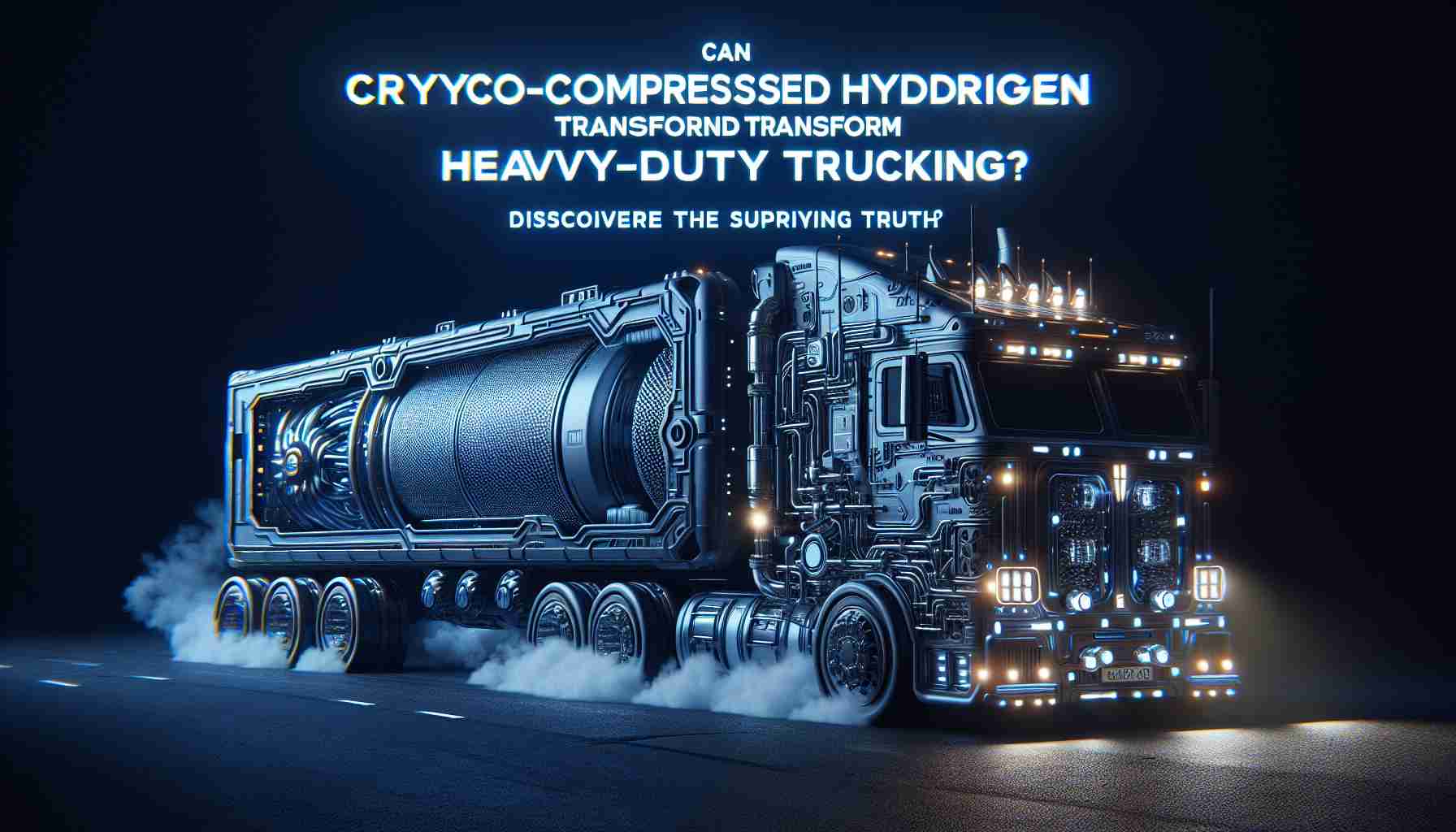The hydrogen transportation industry has encountered significant hurdles in recent years, prompting experts to search for innovative solutions. One such potential solution is cryo-compressed hydrogen (CcH2), which could address some persistent challenges faced by hydrogen trucking and the wider hydrogen market.
Despite earlier predictions of rapid advancements, the hydrogen sector’s growth has been slower than anticipated. High production and distribution costs for hydrogen, coupled with a scarce network of refueling stations, have hampered its widespread adoption. The latest findings from the International Energy Agency (IEA) indicate that while hydrogen use in transportation is indeed increasing, total demand only reached 60,000 tonnes in 2023. This figure represents a mere fraction—less than 0.1%—of the overall global hydrogen demand.
As the industry grapples with these obstacles, the exploration of cryo-compressed hydrogen may offer a promising avenue for progress. CcH2 has the potential to reduce costs and enhance storage efficiency, making it a vital component in meeting the growing needs of heavy-duty trucking. By overcoming these barriers, the hydrogen sector could take a significant step forward, unlocking new possibilities in the pursuit of sustainable transportation solutions.
With continual innovation and dedication, the hydrogen transportation landscape may soon experience the breakthrough it desperately needs. The future of heavy-duty trucking could be brighter, provided that the industry embraces advancements like cryo-compressed hydrogen.
Broader Implications of Emerging Hydrogen Technologies
The challenges faced by the hydrogen transportation industry reflect deeper societal implications, particularly as the world seeks to transition to sustainable energy sources. The slow progress of hydrogen adoption underscores the lingering dependence on fossil fuels, posing questions about the pace of climate action. This reliance could hinder global efforts to meet carbon reduction targets, affecting environmental policies and economic strategies worldwide.
Moreover, the integration of cryo-compressed hydrogen (CcH2) might not only reshape hydrogen logistics but also disrupt traditional energy markets. As efficiency improves and costs drop, industries heavily reliant on diesel may face increased pressure to adapt or risk obsolescence. This shift could lead to a significant reallocation of resources towards hydrogen infrastructure, stimulating investment and job creation in new energy sectors.
On an environmental front, widespread adoption of hydrogen as a clean fuel could diminish greenhouse gas emissions from commercial transportation. The potential for CcH2 to enhance storage capacities means that logistics networks could become more versatile, catering to other renewable energy sources. This flexibility could spur innovations in energy management systems, supporting a more resilient global economy.
As the hydrogen sector navigates these changes, it reflects a critical intersection of technology and sustainability. Long-term significance lies in establishing hydrogen not merely as an alternative energy source but as a cornerstone of a future where global transportation is harmonized with environmental imperatives.
Unlocking the Future of Hydrogen Transportation: Cryo-Compressed Hydrogen on the Horizon
Overview of the Hydrogen Transportation Industry
The hydrogen transportation sector is at a critical crossroads, grappling with substantial challenges that have stunted its expansion. Predictions of swift advancements have largely not come to fruition, leading experts to explore innovative solutions to escalate hydrogen’s viability as a mainstream fuel source.
The Promise of Cryo-Compressed Hydrogen (CcH2)
One of the most promising advancements in the hydrogen market is the development of cryo-compressed hydrogen (CcH2). This technology combines the principles of cryogenic storage and compression, allowing hydrogen to be stored at -253°C. This approach enhances both the storage density and transport efficiency of hydrogen, making it a game-changer for the heavy-duty trucking segment.
Benefits of Cryo-Compressed Hydrogen
– Enhanced Efficiency: CcH2’s compressed form holds more energy for transport, which addresses significant limitations associated with traditional hydrogen fuels.
– Cost Reduction: By streamlining the storage and transport process, CcH2 could significantly decrease production and distribution costs, making hydrogen more competitively priced against fossil fuels.
– Improved Infrastructure Compatibility: The adoption of cryo-compressed hydrogen could lead to more effective utilization of existing refueling infrastructure, optimizing the transition towards a comprehensive hydrogen network.
Market Analysis
As of 2023, global hydrogen demand stood at 60,000 tonnes, reflecting only a tiny fraction of its potential. The slow uptake of hydrogen solutions in transportation has been attributed to high costs and a lack of refueling stations. However, innovations like CcH2 may facilitate an uptick in demand by easing these bottlenecks.
According to the International Energy Agency (IEA), while recognition of hydrogen’s role is growing, the required infrastructure to support a large-scale shift to hydrogen-based transportation remains underdeveloped. Investment in new technologies and refueling stations will be crucial for future growth.
Trends and Insights
The push for sustainable transportation aligns with broader trends in the automotive industry, including the electrification of vehicles. However, hydrogen presents unique advantages in specific sectors, particularly heavy-duty trucking and freight transport, where battery technologies may struggle due to weight and range limitations.
Experts predict that greater emphasis on sustainability will drive more investments into hydrogen technologies, as companies look to reduce their carbon footprints and meet regulatory pressures related to emissions.
Use Cases of Cryo-Compressed Hydrogen
– Heavy-Duty Trucks: CcH2 is especially well-suited for long-haul trucking applications, where the energy density of hydrogen can offer significant range advantages over battery electric vehicles.
– Shipping and Freight Transport: The maritime industry is exploring hydrogen as a potential solution to decarbonize international shipping, with CcH2 providing an effective fuel source for ships requiring high energy density.
Limitations and Challenges
While CcH2 shows great promise, several limitations must be addressed:
1. High Initial Investment: Developing cryogenic storage facilities and retrofitting existing refueling stations for CcH2 may require significant financial outlay.
2. Temperature Control: Maintaining low temperatures for cryo-compressed hydrogen storage requires energy, which can offset some of the environmental benefits.
3. Safety Concerns: Handling cryogenic fluids necessitates stringent safety protocols to prevent accidents.
Future Predictions
As investments in cryogenic and hydrogen technologies grow, we can anticipate a transformation within the hydrogen transportation sector. If the industry effectively harnesses innovations like CcH2, we may soon witness a surge in hydrogen adoption across a range of transportation applications, paving the way for greener, more sustainable practices.
For more insights into the future of energy and transportation, visit IEA for the latest reports and studies.












